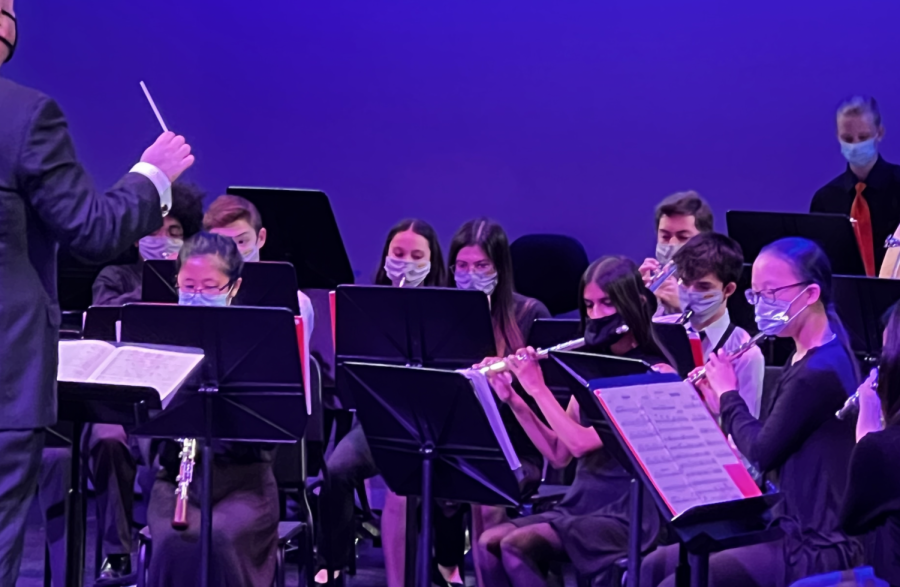Opinion: Co-enrollment requirements are a restriction on student freedom
Credit: Kally Proctor
WSPN’s Kally Proctor discusses the issues behind the co-enrollment requirements present in Wayland High School’s fine arts department.
January 3, 2022
Picture this: you are a student that wants to take the Honors Jazz Ensemble elective at Wayland High School. The course requires an audition, but with some practice, you think you can get in. There’s just one problem: you only have one empty elective space left.
“But shouldn’t Jazz Ensemble only take up one period?” you think. And you would be right… for the most part.
Let’s back up a bit. Currently, WHS requires all students who want to take Honors Jazz Ensemble (HJE) to audition for the course beforehand. In addition to this, most of the students also have to be enrolled in Honors Wind Ensemble (with the exception of instruments that don’t “fit” in Wind Ensemble, such as guitar or piano). This co-enrollment requirement limits who can participate in HJE, and it bars potential auditioners from taking the course. Students who may want to take another elective in addition to jazz, or only have one available elective space for whatever reason, are essentially blocked from taking HJE.
The school’s rationale for this seems to be that Wind Ensemble is where students will learn the skills and techniques needed to better play their instruments. HJE is a more specialized music course where students focus specifically on playing jazz-style music, and students work on more jazz-centered skills, such as improvisation. The skills needed to play jazz are somewhat different from those needed to play classical music. In Wind Ensemble and the regular band courses, students are, along with their classical repertoire, taught base skills and techniques for their instruments. This allows students to further develop their music-playing abilities in all genres of music.
I do understand the need for students to have a good playing ability before they can take add-on music courses and the school’s want for students to be able to learn and grow alongside their classmates. However, I don’t understand why the school isn’t willing to make exceptions for some players, especially when they already do for others.
In my opinion, the school’s co-enrollment requirement and unwillingness to make exceptions is inherently unfair.
This issue is best exemplified in the guitar and piano players. These students do not have to participate in Wind Ensemble because their instruments are not present in that group. The way these students’ skills are evaluated prior to joining HJE is through the audition process. But then, if piano and guitar players can participate in HJE after passing the auditions without being in Wind Ensemble, then why can’t others, like brass or wind players? The fact that both sets of players have to audition, but only one has to be enrolled in both ensembles exposes a double standard within the system.
However, this policy is not just present at WHS. Other schools in the area, including Wellesley, Newton South, Newton North, Dover Sherborn, Lexington and Needham require auditions of some sort for their jazz or Honors Jazz Ensembles. Of these schools, Wellesley, Dover Sherborn and Needham also have a co-enrollment requirement in addition to auditions (Lincoln Sudbury has a co-enrollment requirement, but no auditions, and the Jazz Ensemble and Concert Band courses are assigned to the same class period).
Co-enrollment requirements exist because directors want their students to be able gain the basic skills and techniques that will help them play their instrument better, and they want them to keep building onto those skills. However, the method of co-enrollment may not be the best way to do this, because, as I mentioned, it tends to limit students who may want to play in the jazz band.
So, on one hand, we have the need for students to keep learning and improving at their instruments, and on the other hand, we have students who are unable to take an elective offered by the school because of the enrollment requirements. It might seem like we’ve reached a stalemate, but there is a possible solution. Let’s go back to the guitar and piano players. They’re made (along with everyone else) to go through an audition process to show that their skill level is proficient to join HJE. If there was a brass or wind player who had a higher proficiency level, they should be able to bypass the co-enrollment requirements by proving that they’re at that higher standard. If a student is good enough at the audition, it proves that they have the basic skills that would be taught in Wind Ensemble and therefore don’t need to take that course.
A good example of this would be something that occurred at a summer camp I went to as a little kid. At this camp, they made all the kids take a test to determine if they were allowed to go in the swimming pool or not. Similar to the basic audition to get into HJE, if you passed the test, you could use the swimming pool. However, if kids wanted to swim in the deep end of the pool, they had to take a somewhat harder test to prove they were proficient enough swimmers. In a similar way, if a student wanted to be able to take HJE without being co-enrolled in Wind Ensemble at the same time, it would make sense to give them a harder audition at the beginning of the school year.
No matter what the school chooses to do, it’s no doubt that the current system of co-enrollment requirements restricts students from taking Honors Jazz Ensemble. Those who want to take another elective along with Jazz Ensemble, as well as those who only have a single elective space, are unable to do so. Thus, the necessity to take two electives simultaneously in order to take the course blocks many who want to participate in HJE from doing so, so it poses a problem that needs to be addressed.





![Last Wednesday, the Wayland School Committee gathered to discuss a number of topics regarding the health curriculum and Innovation Career Pathway course. Another large topic of conversation was the ways to potentially mitigate distracting cell phone usage. "These [phones] are going to distract your learning and social relationships," Superintendent David Fleishman said. "That's concrete right there."](https://waylandstudentpress.com/wp-content/uploads/2025/06/Screenshot-2025-06-04-at-9.49.31 PM-1200x886.png)



























![Troy Hoyt finishes the Boston Marathon, running for the Hoyt Foundation. T. Hoyt is the son of Hoyt Foundation CEO Russ Hoyt.
“[Running a marathon] might seem like a big thing, when it’s presented to you at first, but if you break it up and just keep telling yourself, “Yes, you can,” you can start chipping away at it. And before you know it, you’ll be running the whole 26 miles, and you won’t even think twice about it.” T. Hoyt said.](https://waylandstudentpress.com/wp-content/uploads/2025/04/C36E8761-1CBB-452E-9DF2-543EF7B1095E_1_105_c.jpeg)













































